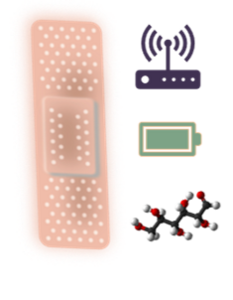
Wearable sensors have the potential to monitor patient’s health remotely, providing clinicians valuable physiological data to enable better disease diagnosis and treatments. Currently, commercially-available wearable sensors (e.g., fitness trackers) are limited to making physical measurements (e.g., heartrate, respiration rate, sleep cycle), which offer little diagnostic value. To improve monitoring capabilities we need to create sensors that can make chemical measurements from biologically available fluids (e.g. sweat, blood, wound fluid). Towards this goal, I am working on the development of a fabric-based smart bandage capable of measuring biomarkers in patient’s wound fluid to monitor healing progress.
My research is focused on developing non-invasive wearable chemical sensors capable of sampling and testing a patient’s biologically-available fluids to deliver clinically-relevant measurements. The approach to building wearable chemical sensors is inspired by the field of paper-based microfluidics, which has produced low-cost tests (e.g., pregnancy test) capable of automated detection of biomarkers in an easy-to-use format. I am working to build similar testing capabilities into fabric-based devices that offer increased flexibility and strength – making them well-suited for wearable applications. For the complete summary, please follow the link and view the Prezi I have prepared.
